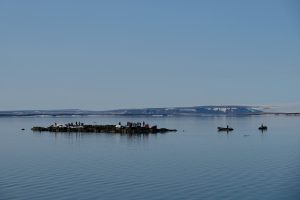 Shoes, helmets, shower gel bottles: In 2019, we continued the Citizen Science Beach Litter project for the Alfred Wegener Institute for Polar and Marine Research (AWI). Together with our guests we collected garbage on two islands in the Hinlopen Strait in Spitsbergen, with very different results. Part of this litter is now on its way again – to be analyzed in Germany.
Shoes, helmets, shower gel bottles: In 2019, we continued the Citizen Science Beach Litter project for the Alfred Wegener Institute for Polar and Marine Research (AWI). Together with our guests we collected garbage on two islands in the Hinlopen Strait in Spitsbergen, with very different results. Part of this litter is now on its way again – to be analyzed in Germany.
Read more
Plastic
Plastic fantastic (2) – We have to think bigger. A provocation.
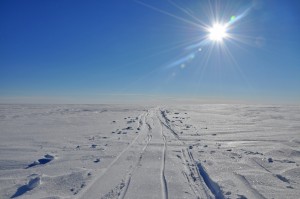 “It doesn’t make any difference” – I hear this sentence often when I talk about plastic avoidance in everyday life. While I used to argue that everything we do helps, I’ve changed my mind. I meet so many people who care about the smallest crumb of microplastic. At the same time, decisions are still being made elsewhere that outweigh million-fold these tedious plastic savings. That is why this text has now become a provocation: We have to stop mixing creams and to start thinking bigger. We have to become more aggressive, pool our energy, take action where greater benefits can be expected. Because we are running out of time.
“It doesn’t make any difference” – I hear this sentence often when I talk about plastic avoidance in everyday life. While I used to argue that everything we do helps, I’ve changed my mind. I meet so many people who care about the smallest crumb of microplastic. At the same time, decisions are still being made elsewhere that outweigh million-fold these tedious plastic savings. That is why this text has now become a provocation: We have to stop mixing creams and to start thinking bigger. We have to become more aggressive, pool our energy, take action where greater benefits can be expected. Because we are running out of time.
Plastic fantastic (1) – First check what’s inside
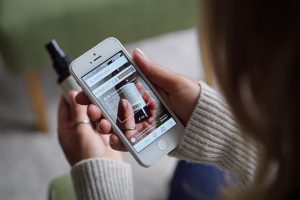
If you don’t have knowledge, you cannot act. That is why I am so enthusiastic about the many practical apps that are now available: With their help, you can find out about the ingredientsof almost any product in a matter of seconds, what is good and bad about these substances and whether the product as a whole is good or harmful. You can learn all this just by scanning the barcode. If you scan some of the products you use at home in your daily life with these free apps, you will be amazed at what you will learn. As a first step towards a life with less plastic, I therefore recommend you simply look up what you already have on your shelves. Then you can decide whether you want to continue using these products or, if necessary, look for alternatives.
Plastic-fantastic! Plastic is too valuable to waste – a series about alternatives
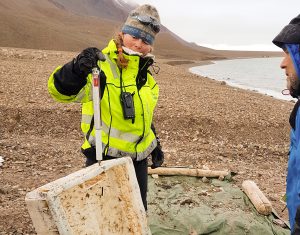
When I started getting involved with plastic a few years ago, I was still a novelty on the scene. Most people were not even aware of the problem. Fortunately, that has today now changed. I am so glad that I did not let myself get dissuaded in my fight against plastic waste in the early days – because it is truly wonderful how much interest the project and I now get, how much support I get and what wonderful people I have encountered as a result. This makes me so happy! And this is why the next stage is now coming: I am starting a series about plastic because I am constantly being asked the same questions: What alternatives are there to plastic? What can I do and do alone? What exactly is the deal with microplastics, with glass versus plastic bottles or with sewage treatment plants in Germany? In this series I’ll show you what I’ve changed in my life myself – you can just copy it and save yourself the hassle of searching for solutions. It is much easier (and often cheaper) than you think!
Why your Fleece is Part of the Plastic Soup
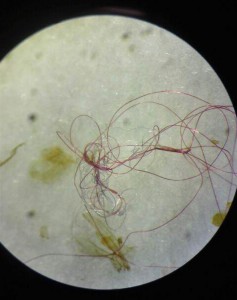
One of my favourite winter jackets is made of fleece. Unfortunately, that is bad. I learned that, when I updated my lecture about plastic pollution which I hold on ships. I once again realized, how often we contribute to the pollution and intoxication of our planet, without even being aware of it. The Alfred-Wegener-Institut for Polar- and Marine Research gave me some material, in which I found the following: With every washing of a fleece-sweater, about 1900 fibres are washed out. The fibres get into the wastewater, and many sewage plants cannot filter them. As a result, they become part of the micro plastic-problem. These particles enter our food chain. Either because a fish eats them, or because the softeners of the plastic go into the water, or both. There are many variations, how plastic finds his way back to us. Sure is only: It comes back.
A study in Spitsbergen has now shown, that Fleece-Sweaters are not at all a small part of the problem.
